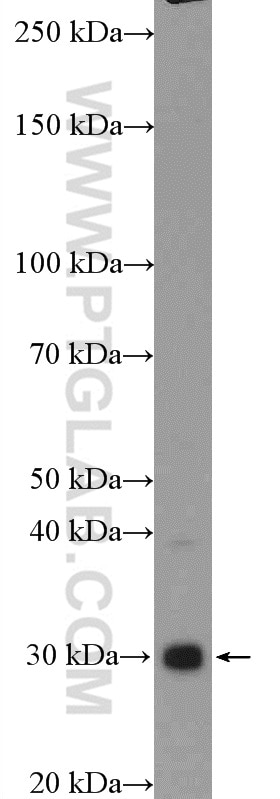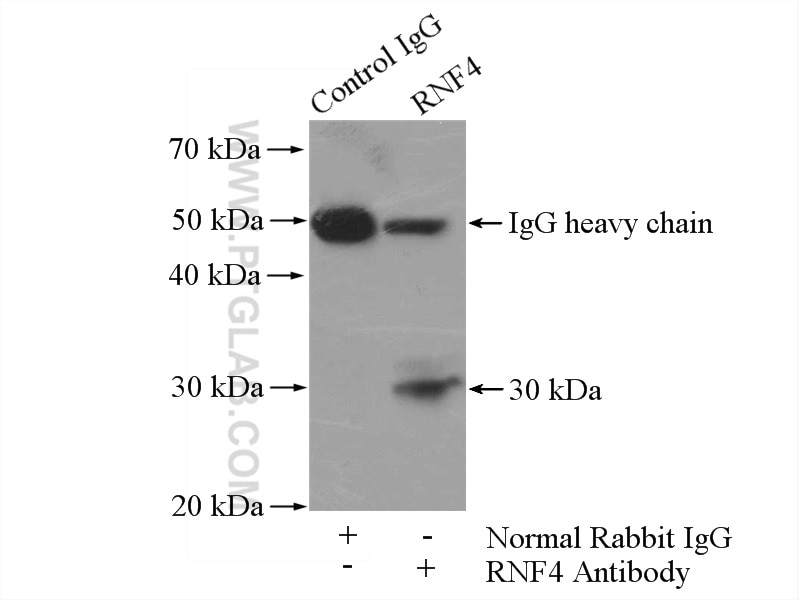- Phare
- Validé par KD/KO
Anticorps Polyclonal de lapin anti-RNF4
RNF4 Polyclonal Antibody for WB, IP, ELISA
Hôte / Isotype
Lapin / IgG
Réactivité testée
Humain, rat, souris
Applications
WB, IP, CoIP, ELISA
Conjugaison
Non conjugué
N° de cat : 17810-1-AP
Synonymes
Galerie de données de validation
Applications testées
| Résultats positifs en WB | cellules PC-3, |
| Résultats positifs en IP | cellules PC-3 |
Dilution recommandée
| Application | Dilution |
|---|---|
| Western Blot (WB) | WB : 1:500-1:1000 |
| Immunoprécipitation (IP) | IP : 0.5-4.0 ug for 1.0-3.0 mg of total protein lysate |
| It is recommended that this reagent should be titrated in each testing system to obtain optimal results. | |
| Sample-dependent, check data in validation data gallery | |
Applications publiées
| KD/KO | See 3 publications below |
| WB | See 6 publications below |
| CoIP | See 1 publications below |
Informations sur le produit
17810-1-AP cible RNF4 dans les applications de WB, IP, CoIP, ELISA et montre une réactivité avec des échantillons Humain, rat, souris
| Réactivité | Humain, rat, souris |
| Réactivité citée | Humain, souris |
| Hôte / Isotype | Lapin / IgG |
| Clonalité | Polyclonal |
| Type | Anticorps |
| Immunogène | RNF4 Protéine recombinante Ag12115 |
| Nom complet | ring finger protein 4 |
| Masse moléculaire calculée | 190 aa, 21 kDa |
| Poids moléculaire observé | 30 kDa |
| Numéro d’acquisition GenBank | BC031935 |
| Symbole du gène | RNF4 |
| Identification du gène (NCBI) | 6047 |
| Conjugaison | Non conjugué |
| Forme | Liquide |
| Méthode de purification | Purification par affinité contre l'antigène |
| Tampon de stockage | PBS avec azoture de sodium à 0,02 % et glycérol à 50 % pH 7,3 |
| Conditions de stockage | Stocker à -20°C. Stable pendant un an après l'expédition. L'aliquotage n'est pas nécessaire pour le stockage à -20oC Les 20ul contiennent 0,1% de BSA. |
Informations générales
RNF4 is a E3 ubiquitin-protein ligase that binds polysumoylated chains covalently attached to proteins and mediates 'Lys-6'-, 'Lys-11'-, 'Lys-48'- and 'Lys-63'-linked polyubiquitination of those substrates and their subsequent targeting to the proteasome for degradation. It regulates the degradation of several proteins including PML and PEA3[PMID:18408734]. It also participates in chromosome alignment and spindle assembly, and regulates the kinetochore CENPH-CENPI-CENPK complex by targeting polysumoylated CENPI to proteasomal degradation. In addition, RNF4 can regulates the cellular responses to hypoxia and heat shock through degradation of respectively EPAS1 and PARP1 [PMID:20026589]. Alternatively, it may also bind DNA/nucleosomes and have a more direct role in the regulation of transcription for instance enhancing basal transcription and steroid receptor-mediated transcriptional activation [PMID:11319220]. RNF4 exist as two isoforms. Isoform one is a 30 kDa protein and isoform two is a about 15 kDa protein. RNF4 binds polysumoylated chains and the molecular weight of RNF4 migrate in the experiment to 35 kDa, 47 kDa, 69 kDa as ubiquitinated protein.
Protocole
| Product Specific Protocols | |
|---|---|
| WB protocol for RNF4 antibody 17810-1-AP | Download protocol |
| IP protocol for RNF4 antibody 17810-1-AP | Download protocol |
| Standard Protocols | |
|---|---|
| Click here to view our Standard Protocols |
Publications
| Species | Application | Title |
|---|---|---|
Nat Commun Crosstalk between SUMOylation and ubiquitylation controls DNA end resection by maintaining MRE11 homeostasis on chromatin | ||
Int J Mol Sci The E3 Ubiquitin-Protein Ligase RNF4 Promotes TNF-α-Induced Cell Death Triggered by RIPK1. | ||
ACS Chem Biol Covalent Ligand Screening Uncovers a RNF4 E3 Ligase Recruiter for Targeted Protein Degradation Applications. | ||
J Biol Chem Analysis of a degron-containing reporter protein GFP-CL1 reveals a role for SUMO1 in cytosolic protein quality control
| ||
Theranostics CSF2RB overexpression promotes the protective effects of mesenchymal stromal cells against ischemic heart injury
| ||
Exp Cell Res RNF4 promotes tumorigenesis, therapy resistance of cholangiocarcinoma and affects cell cycle by regulating the ubiquitination degradation of p27kip1 in the nucleus
|
Avis
The reviews below have been submitted by verified Proteintech customers who received an incentive forproviding their feedback.
FH Chun (Verified Customer) (06-19-2022) | This antibody worked well.
|



